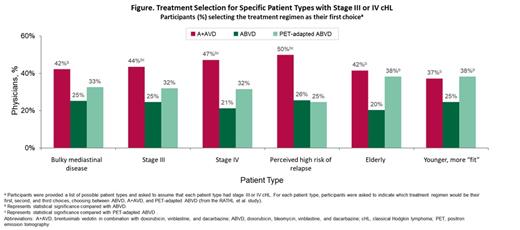Abstract
Background
Mainstay therapies for patients with stage III or IV classical Hodgkin lymphoma (cHL) include several multiagent chemotherapy regimens. A combination of doxorubicin, bleomycin, vinblastine, and dacarbazine (ABVD) is commonly administered in the first-line (1L) setting; however, ~30% of patients with stage III or IV cHL will be refractory to or relapse following ABVD treatment. Brentuximab vedotin, doxorubicin, vinblastine, and dacarbazine (A+AVD), a novel targeted therapy in combination with a standard chemotherapy regimen, is another option for 1L treatment of stage III or IV cHL. In the 5-year update of the ECHELON-1 trial (Straus, 2021), patients with stage III or IV cHL randomized to 1L A+AVD compared with ABVD continued to demonstrate progression-free survival (PFS) improvement with a 32% reduction in the risk of progression or death (HR=0.681, nominal P=0.002). To understand the decision-making process when selecting a 1L cHL treatment regimen for stage III or IV cHL, we surveyed physicians to gain insights into their preferred regimens and factors that influence their treatment choices as part of CONNECT, the first real-world observational survey in cHL that includes physicians, patients, and caregivers.
Methods
Physicians in the United States who treat patients with cHL were recruited to participate in an Institutional Review Board-approved, online anonymous survey from October 19, 2020-November 16, 2020. Eligible participants were medical oncologists, hematologist/oncologists, or hematologists with ≥2 years medical practice experience who, within the past 12 months, had treated ≥1 adult (aged ≥18 years) with stage III or IV cHL and ≥1 adult in the 1L setting.
Results
Of participating physicians (N=301), 62% were community-based and 80% identified themselves as a hematologist/oncologist, reporting a median of 15 years of experience. Participants saw a median (interquartile range) of 16 (7-40) patients with active, newly diagnosed cHL and 15 (8-40) cHL survivors in the 12 months preceding survey participation. The most important considerations (ranked 1 or 2) for cHL treatments were clinical trial efficacy and safety data (60%) and official guideline recommendations (58%). Specifically, efficacy attributes including overall survival (OS; 91%), long-term PFS (86%), curative potential (85%), and complete response (81%) were rated highest or as having the most essential impact. In contrast, patient personal goals (6%), treatment costs (4%), and patient financial support programs (4%) were endorsed by <10% of participants. When asked about acceptable long-term toxicity trade-offs for increased efficacy in patients with stage III or IV cHL, participants stated that an additional median of 8 months of OS and 6 months of PFS were worth the potential for downstream toxicity. Fifty percent of participants reported that disease stage was the most important patient characteristic to consider when deciding on 1L cHL treatment. In patients with newly diagnosed stage III or IV cHL, 37% to 50% of participants selected A+AVD as their first-choice regimen across various populations (Figure); no significant differences in preferences were noted between community and academic practice settings. Participants reported selecting intensive treatment regimens based on OS and PFS and less intensive regimens (e.g., AVD) based on age, comorbidities, and patient quality of life.
Conclusions
Efficacy attributes, including OS and PFS; quality of life; and patient age were top reasons cited by surveyed participants for selecting a specific 1L treatment regimen in stage III or IV cHL. Treatment preferences for newly diagnosed stage III or IV cHL varied based on patient characteristics including presence of bulky mediastinal disease, disease stage, perceived risk of relapse, age, and comorbidities.
Yu: Seagen, Inc: Current Employment, Current equity holder in publicly-traded company. Liu: Seagen, Inc: Current Employment, Current equity holder in publicly-traded company. Kumar: Seagen, Inc: Consultancy. Fanale: Seagen, Inc: Current Employment, Current equity holder in publicly-traded company. Flora: Seagen, Inc: Research Funding. Parsons: SeaGen: Consultancy.


This feature is available to Subscribers Only
Sign In or Create an Account Close Modal